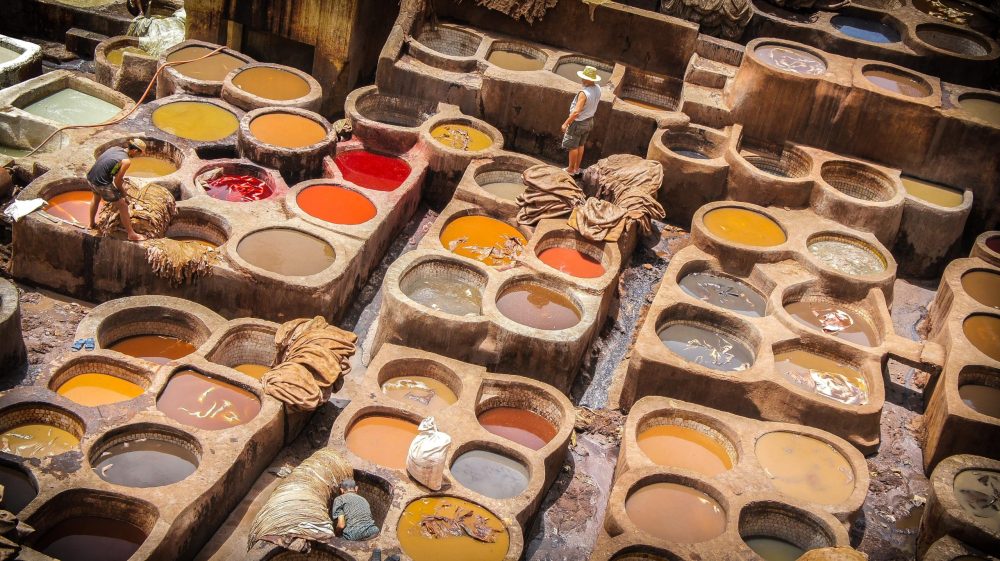Africa
Fez-Meknes/Industry: PIAC Development Work Exceeds 70%
The accession of tanners and manufacturers of leather goods to the Industrial Park Ain Cheggag is a crucial step to get the sector out of its lethargy and increase its competitiveness in the national and international markets. This project should put an end to the informal practices that hamper the development of this industry at the regional and national levels.

Several business leaders in the city of Fez encounter difficulties in complying with the requirements of the SPC in connection with the Industrial Park Ain Cheggag (PIAC). In addition, small and medium enterprises express fears about the sustainability of their investments, knowing that the sector is still facing competition from informal enterprises that have decided not to settle in the PIAC.
The development of the industrial park Ain Cheggag (PIAC) is underway to meet critical needs, including the modernization of the leather industry, strengthening its competitiveness at the regional level, and the consolidation of the leather ecosystem at the national level. Currently, according to project officials, the rate of progress of work is over 70%. The delivery of the project is scheduled for 2023, apart from the wastewater treatment plant (WWTP), whose work will be launched soon. With an award rate of nearly 50% in the various calls for projects launched since the launch of its marketing last July, this project should generate strong interest among the region’s industrialists, eager to develop their activities in this high-potential sector.
Read more on the subject and find the latest economic news in the world with our companion app Born2Invest.
Specific support for small and medium-sized businesses in Fez-Meknes is needed
The accession of tanners and manufacturers of leather goods to the Industrial Park Ain Cheggag is a crucial step to get the sector out of its lethargy and increase its competitiveness in the national and international markets. This project should put an end to the informal practices that hamper the development of this industry at the regional and national levels. Nevertheless, the majority of companies in the region specializing in tanning are characterized by their low financing capacity, which complicates their compliance with the CPS set up to benefit from this new platform.
In this context, several business leaders in the area of Ain Nokbi (semi-industrial) have told us of their difficulties in complying with the requirements, including that of a deposit of 40% of the lot price to confirm the acquisition. The project holders who fail to pay this amount will see their applications canceled. Leather companies wishing to set up in the PIAC will also have to commit to closing down their old (informal) factories and to respecting environmental standards relating to the treatment of liquid and solid waste.
However, the TPMEs of the region fear that their investments are not sustainable, knowing that the sector will still face competition from informal enterprises that have decided to continue their activities outside the PIAC, which will affect the transparency of marketing channels and maintain unfair competition in the sector. In this context, the operators of the sector call on officials to put in place a regulation that prohibits the activities of tanning outside the PIAC, and to ensure specific support for SMEs in the sector to encourage them to join this new project.
An opportunity to seize
This project aims to boost the traditional sector of the leather industry in the region of Fez-Meknes, which has a strong growth potential. Indeed, this initiative will not only improve the standard of living of the population of the province of Sefrou but also create industrial activities with high potential and generate employment. The PIAC is specially dedicated to companies wishing to develop industrial projects and offers the sale or rental of lots.
Thanks to the subsidy granted by the supervisory ministry and the Region, the cost of the land could be reduced from an actual cost of 1,100 DH/sqm to a transfer price of 250 DH/sqm for the area reserved for leather production, such as tanneries, footwear, and leather goods, and 350 DH/sqm for the generalist area, which includes chemicals, textiles, food processing, mechanical, metallurgical and electromechanical industries.
This initiative is a real opportunity for the development of the leather industry in the region. Companies will be able to benefit from quality infrastructure and resources, making it easier for them to develop and better respond to market demands.
__
(Featured image by Vince Gx via Unsplash)
DISCLAIMER: This article was written by a third party contributor and does not reflect the opinion of Born2Invest, its management, staff or its associates. Please review our disclaimer for more information.
This article may include forward-looking statements. These forward-looking statements generally are identified by the words “believe,” “project,” “estimate,” “become,” “plan,” “will,” and similar expressions. These forward-looking statements involve known and unknown risks as well as uncertainties, including those discussed in the following cautionary statements and elsewhere in this article and on this site. Although the Company may believe that its expectations are based on reasonable assumptions, the actual results that the Company may achieve may differ materially from any forward-looking statements, which reflect the opinions of the management of the Company only as of the date hereof. Additionally, please make sure to read these important disclosures.
First published in LES ECO.ma, a third-party contributor translated and adapted the article from the original. In case of discrepancy, the original will prevail.
Although we made reasonable efforts to provide accurate translations, some parts may be incorrect. Born2Invest assumes no responsibility for errors, omissions or ambiguities in the translations provided on this website. Any person or entity relying on translated content does so at their own risk. Born2Invest is not responsible for losses caused by such reliance on the accuracy or reliability of translated information. If you wish to report an error or inaccuracy in the translation, we encourage you to contact us.

-

 Impact Investing2 weeks ago
Impact Investing2 weeks agoClimate Losses Drive New Risk Training in Agriculture Led by Cineas and Asnacodi Italia
-

 Cannabis10 hours ago
Cannabis10 hours agoColombia Moves to Finalize Medicinal Cannabis Regulations by March
-

 Crowdfunding1 week ago
Crowdfunding1 week agoReal Estate Crowdfunding in Mexico: High Returns, Heavy Regulation, and Tax Inequality
-

 Cannabis5 days ago
Cannabis5 days agoSouth Africa Proposes Liberal Cannabis Regulations with Expungement for Past Convictions
























